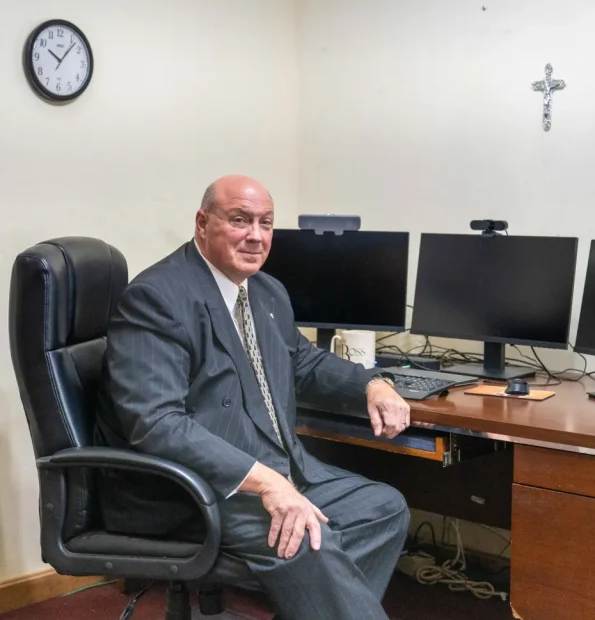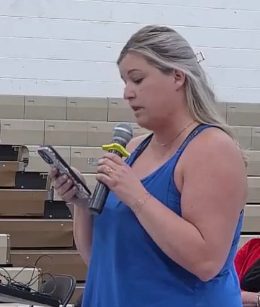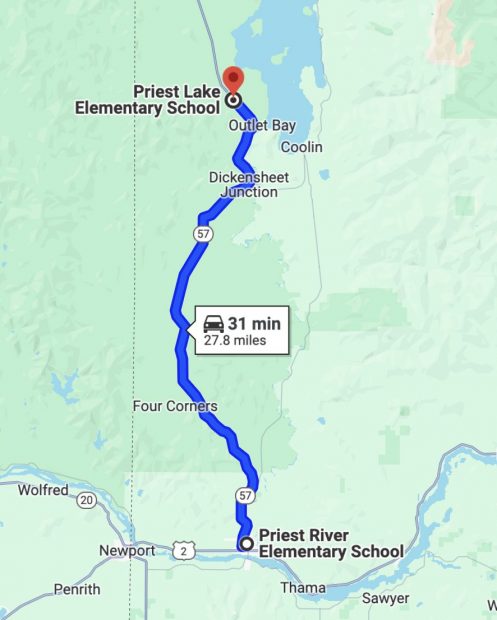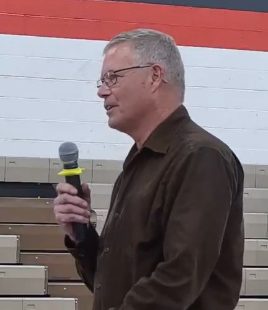This story was updated on June 10 with a correction: West Bonner’s failed ballot measure was a one-year levy, not a two-year levy.
After a season of unprecedented financial and leadership turmoil, West Bonner school trustees this week decided to close a school and select a new superintendent.
Trustees unanimously decided to close Priest River Junior High at a special meeting that stretched on for five hours Wednesday. It was a contentious decision, punctuated by the concerns, opinions, and support from vocal parents, patrons, and staff.
It’s one of two major changes slated for the troubled district.
Tuesday, trustees offered the superintendent position to Kim Spacek, the current leader at Mountain View School District — which has been marked by its own strife. Spacek’s contract there was not renewed.
If Spacek accepts, he’ll be replacing interim superintendent Joe Kren, who stepped in after the fiasco that ensued when Branden Durst briefly became the district’s leader.
In closing the junior high, West Bonner School District joins a handful of others in the state — including Coeur d’Alene, Nampa, and Caldwell— that have closed schools due to budget shortfalls.
School leaders statewide have attributed their financial woes to declining enrollment, expiring pandemic dollars, and overwhelming maintenance needs. In some districts, like Caldwell and West Bonner, levy failures have compounded budgetary issues.
Closing the junior high will provide minimal savings, Kren says. Meanwhile, “we barely have a month’s worth of bills in the bank.”
Dean Davis, the district’s finance director, said West Bonner is facing a $2.89 million reduction in federal and state dollars in 2025 compared to 2024. Trustees asked for a one-year, $4.6 million levy in May, but it was rejected with 54% voting against it.
After the district covers the revenue loss, it will have just over $1 million in the budget — “We barely have a month’s worth of bills in the bank,” Kren said in an interview with EdNews.

That puts the district in an uncomfortable financial position, without a lot of wiggle room if an emergency pops up, Kren said. The Government Finance Officers Association recommends having a reserve of 15% of the overall budget on hand at any given time, which would be $1.6 million for West Bonner.
The closure of the junior high school will result in “minimal savings,” Kren said, partly because it will still have to be heated and otherwise kept up to prevent damage.
As Ryan Curruth, West Bonner’s operations director, said: “You just can’t let a building go dormant in the winter in North Idaho.”
When asked why the school is being closed if the cost savings are not meaningful, Kren said: “That’s a good question for the board.”
A Thursday phone call to Board Chair Margaret Hall for comment was not immediately returned.
Davis confirmed in an email Thursday that the school’s closure will save $876,900.
“One school closing is better than zero schools closing,” Davis told trustees at one point during Wednesday’s meeting. He said the junior high is more costly to run than any other school, and said “we’re this far away from some type of emergency over there with the boilers and things like that, so we know there’s risk there.”
Carruth said the building is “a bit of a curse,” and Hall called it an “albatross.”
Ultimately, trustees decided unanimously to close the junior high, but continue to heat it and seventh and eighth graders will move to Priest River Lamanna High School, but be kept separated from older students by learning in a designated section of the school.
It would essentially be “a school within a school,” Kren said.
The high-stakes decision came after impassioned testimony from parents, school staff, and patrons.
The elementary schools are the “heart and soul” of their communities
Located in the rural Idaho panhandle, West Bonner School District comprises five schools — three elementaries, a junior high, and a high school — and multiple communities, including Priest River, Priest Lake, and Oldtown (which is in Idaho, but essentially a suburb of Newport, Wash.).
There’s an elementary school in each of those communities, and at one point, trustees considered closing one or more of the primary schools. Wednesday, patrons were fighting to keep those doors open.
“(Priest Lake Elementary) is the heart and soul of the Priest Lake Community,” Desi Benedict, a local parent, said. “You take that away from our young community and I fear all the young families will be forced to move.”

She said her child is “already exhausted from the longer days” that came when West Bonner switched to a four-day week. “I can’t imagine how tired he is going to be getting on the bus at 6:30 a.m. and not getting home until 5 or later.”

Benedict suggested putting grades K-8 at the elementary schools, and closing the junior high.
Ken Hagman, a “lifelong resident of Priest Lake,” said closing the elementary there would “alienate a large number of people at the lake.”
“I can without question guarantee you that you can probably forget about ever achieving another levy in our district. It will be voted down,” he said.

But keeping elementary schools intact would mean putting middle schoolers and high schoolers together — a move parents opposed as well.
Everybody’s talking about “how they’re going to pull their kids out if they have to make those long bus rides,” Trustee Ann Yount said. “I’ve also heard that sixth-grade parents are not going to send their kids to a joint high school, they will be homeschooling their children. So it’s a weigh and measure game because they have strong feelings about that too.”
Hailey Scott empathized with the board’s difficult decision: “It sucks to listen to sad people who are bummed about losing our schools. But you … only have so much (money), and you are not going to make everybody happy with your decision … So just know that there are people who realize that and support you.”
Dana Douglas called on trustees to run another levy in November, and chastised community members for not supporting the ask in May: “We’re here because we didn’t get to the polls to vote and this sucks.”
Next steps: Fundraising and talk of a November levy
Trustees decided to keep sixth grade students in the elementary schools, and move seventh and eighth graders to the high school, while closing the junior high. It’s a one-year, stopgap measure that trustees will have to revisit after the upcoming school year.
Talk of running another levy came up at the meeting, but Kren pointed out that the deadline to decide is Sept. 6 — so trustees would have to move quickly if they decide to go back to voters.
School leaders on Wednesday also initiated a series of efforts meant to bolster the district’s coffers via fundraising and donations. Those included:
- Supporting a group that’s fundraising for extracurricular and cocurricular activities for the upcoming school year
- Starting an endowment fund for the district
- Seeking additional funding from the community
Kren told EdNews that the district has been through “turmoil and changes and upheaval,” but “it doesn’t matter what comes toward an educator. We have to make it happen. We have to be successful for the students.”
The district’s next meeting will be a special budget hearing on June 12.
